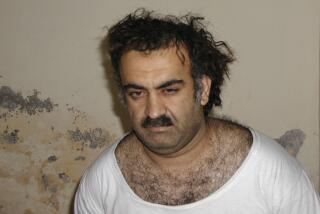Iraqi lawmaker may have link to ’83 U.S. Embassy attack
- Share via
BAGHDAD — U.S. officials said Tuesday that they were working with the Iraqi government to determine whether a member of parliament was a convicted terrorist who had been sentenced to death in Kuwait for involvement in bombing the U.S. and French embassies there in 1983.
The legislator, Jamal Jaafar Mohammed, was elected in December 2005 as a representative from Babil, a province south of Baghdad. Sheik Dhiauddin Fayadh, another legislator, said Mohammed was not aligned with any political party and had not been seen since late December of last year.
Iraqi officials refused to discuss the case, but U.S. officials in Baghdad and Washington acknowledged suspicions surrounding Mohammed and that they were working with Iraq to determine whether he was the same man convicted in Kuwait.
The Kuwait bombings in December 1983 struck the U.S. and French embassies, along with several other targets, leaving at least six people dead. An Iraqi Shiite Muslim by the name of Jamal Jaafar Mohammed was among those convicted and sentenced to death in absentia. He had fled before his trial.
“We are actively investigating these serious allegations and continue to be in close contact with the government of Iraq to pursue this case,” said Lou Fintor, the U.S. Embassy spokesman in Baghdad.
A U.S. counter-terrorism official, who spoke on condition of anonymity because he was not authorized to discuss such matters, said U.S. diplomats had notified Iraqi leaders of their concerns about Mohammed.
“The sense I’ve got is that this is something that has been known, that there have been suspicions about this guy,” the official said.
Ultimately, he said, the Iraqi government would have to decide how to deal with Mohammed.
Iraqi Prime Minister Nouri Maliki told CNN in an interview Tuesday that he would not let his government “be a shelter for outlaws and wanted people.”
*
Times staff writers Raheem Salman in Baghdad and Josh Meyer in Washington contributed to this report.
More to Read
Sign up for Essential California
The most important California stories and recommendations in your inbox every morning.
You may occasionally receive promotional content from the Los Angeles Times.













